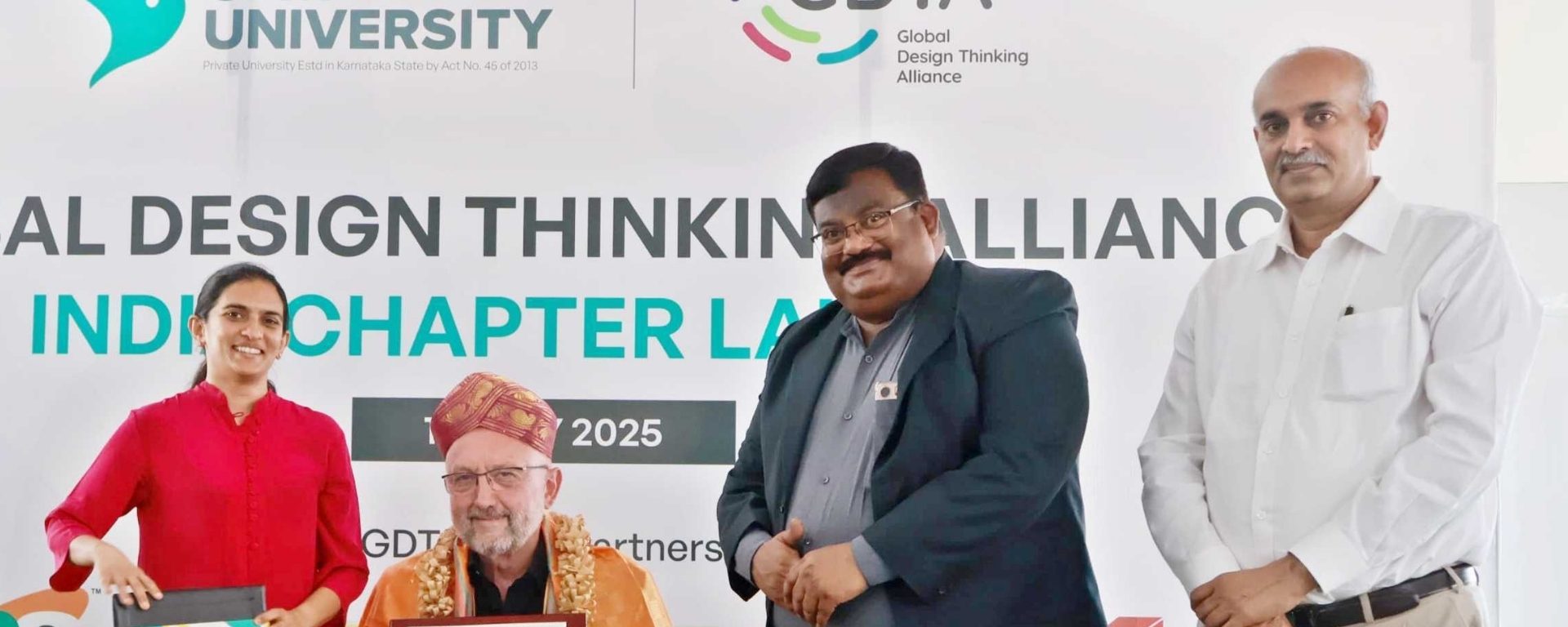CMR University launches the India Chapter of the Global Design Thinking Alliance, leading a national movement to reimagine innovation, education, and inclusion through human-centred design in the age of AI.
By Vindhya Umapathy
On July 10, 2025, CMR University marked a major milestone in India’s innovation journey by hosting the launch of the India Chapter of the Global Design Thinking Alliance (GDTA). The event brought together voices from academia, industry, and the creative economy to explore the growing relevance of Design Thinking in today’s AI-driven world. But this wasn’t just another conference; it was the beginning of a national movement to reframe how we think, design, and build in a world of complexity.
GDTA was founded in 2017 at the Hasso Plattner Institute in Germany and now connects over 40 institutions in 25 countries. With CMR University as its founding India Chapter host, the alliance deepens its global-local mission: advancing Design Thinking through collaboration, education, and social impact.
Dr Tristha Ramamurthy, Provost of CMR University, called the launch a landmark moment for Indian higher education. She stressed the need to build resilient, creative minds that are not afraid to try, fail, and try again, an ethos at the heart of Design Thinking and the kind of learning the future demands.
Design Thinking’s evolution was front and centre in the keynote by Prof. Uli Weinberg, President of GDTA and Director of the HPI School of Design Thinking. He pointed out that in the age of AI, Design Thinking is more relevant than ever. He urged institutions to rethink conventional academic models and replace them with interdisciplinary, empathy-driven approaches that prepare students for uncertainty.
That call to reimagine Design Thinking’s purpose continued in the keynote by innovation strategist Arvind Lodaya. In a talk titled “Make Design Thinking Radical Again,” he challenged participants to move beyond empathy as a buzzword and towards solidarity as a design value, rooted in equity, ethics, and listening to communities on the margins.
Senior Vice President at Mercedes-Benz R&D India, Dr Anshuman Awasthi took this further by describing innovation as a craft. “What gravity is to physics, Design Thinking is to innovation,” he said. He showed how AI is already embedded into their design process, helping teams move from insights to prototypes with agility. But even as tools become more powerful, he stressed the importance of grounding innovation in context and care.
This balance of tech and empathy was echoed by Ms Vindya Sampath from Mindtree. She explained that while AI helps with data and deadlines, it cannot replace the human effort required during ideation and storytelling; the parts of the process where real innovation is born.
At CMR University, that belief is already embedded into the curriculum. Ms Aleksandra Rotar, Director of the School of Design, shared how students go through reflective exercises, strength assessments, and fieldwork to understand communities before designing for them. Mr Muralidhar Reddy, Director of the School of Architecture, drew a powerful connection between Bauhaus ideals and the playful, collaborative nature of Design Thinking that is reshaping Indian design education.
CMRU student Sree Harshitha showcased her team’s project on digital storytelling for heritage sites, highlighting how Design Thinking fosters curiosity, systems thinking, and the ability to solve for root causes rather than surface-level symptoms.
Panelists throughout the day kept returning to one idea: Design Thinking needs to move beyond whiteboards and into action. As moderator Anirban Bhattacharya said, innovation doesn’t happen in comfort zones. It takes critical thinking, creative friction, and a willingness to change the way we learn.
Carolin Tanzer, MD of Impact Week, captured the day’s sentiment perfectly: “AI can support us, but collective storytelling and human connection are more vital than ever.”
With the launch of the GDTA India Chapter, CMR University is not just hosting an international alliance, it is building an ecosystem. One that welcomes complexity, centres communities, and prepares the next generation to lead with purpose.
This is not the end of a conference. As the founding host of the GDTA India Chapter, CMR University is contributing to the growth of a more humane, innovative, and inclusive India.
